Home >>Shipping by Region >>Middle East >> UAE >> Guide for Importing to UAE
Are you planning to import products to the United Arab Emirates from China? We want to make importing from China to the United Arab Emirates as easy and straightforward as possible for your business. For this reason, we’ve gathered crucial information regarding duties and other import taxes, product regulations, labeling requirements, air & sea shipping, and ports, right here on this page.
For many businesses, importing from China has proven to be a successful strategy for global sourcing, but this is not an easy task, especially if you are a new one to it. This process can be very complicated, confusing, messy, and costly. You usually expect long shipping times, delays, rising or fluctuating delivery costs, and regulatory expenses.
Importing from China to the UAE can be a complicated process, which involves many unfamiliar steps and risks.
A. Sourcing from China to the UAE
- 1. Spend time looking for the right supplier
- 2. Factory Audits
- 3. Quality inspections
- 4. Ask for a sample
- 5. Notes before payment
- 6. Some common trade terms
B. Shipping from China to the UAE
- 1. Sea Freight
- 2. Air Freight
- 3. Courier or express shipping
- 4. Customs clearance in the UAE
- 5. Tips for avoiding delays
C. How to save money and time when importing from China to UAE
Do I just buy from the website or do I need to find a purchasing agent in China?
Many of you must have been asking yourselves this question. I will explain below what importing from China means.
First, let's figure out what an importer is - an importer is a person who buys goods from overseas.
If you are buying goods from China for the first time, such as samples, small packages (a few goods) or even letters, then you only need to buy them from their website. On the other hand, if you want to buy a large number of products, it is better to find a reliable freight forwarder to help you with this process.
If you don’t understand Chinese culture and language at all, then looking for a reliable sourcing agent seems to be a good choice. I will list below the advantages of hiring an experienced Chinese freight forwarder:
- He will be fluent in Mandarin and Cantonese,
- He will have a thorough knowledge of the Chinese business culture,
- He will have experience in managing the Chinese suppliers,
- He will have quality control, audit, category, sourcing, and logistics experience.
Choosing a UAE local freight forwarder will cause you to increase costs and wast time, because in most cases, he will have to contact another freight forwarder in China, who will be responsible for picking up, preparing, storing and export customs clearance.
A freight forwarder or shipping agent can not only help you purchase the goods you need, but also help you customize your purchase, audit suppliers, and conduct cargo quality inspections. Broadly speaking, they can quickly solve many problems in the import process, which can save you time and money when importing from China to the UAE.
Of course, if you have a long-term import plan or are interested in understanding the Chinese market, then I suggest you take some time to find a suitable supplier. After all, you can save the commission of the middleman and accumulate a lot of experience. Now, when you decide to purchase goods from China to the UAE, I will provide some necessary guidance.
In this article, we will discuss purchasing and shipping from China to the UAE.
A. Sourcing from China to the UAE
1. Spend time looking for the right supplier
If you decide to buy and import goods by yourself, it’s best to take the time to find the right supplier.
For the best results, you will have to set standards. This is what you should look for when looking for the best supplier: the delivery time from receipt of order to arrival at you, minimum and maximum order quantities (depending on the quantity of goods to be purchased) whether they provide storage and processing facilities, specific Delivery methods, return policy, quality assurance process, quality control, etc.
In addition, you will need to investigate the supplier’s performance and company background.
Once you have set the criteria and evaluated potential suppliers to source from China to the UAE, you will want to know:
• If you buy in bulk, how much do you have to pay per unit, and if you can enjoy any discounts.
• What is the action plan in case of a dispute? When the customer is not satisfied with the received product or the delivery time is delayed, disputes may arise. Is he willing to help you solve the problem?
• Is there a seller’s guarantee? Find out if your supplier will provide you with a 30-day money-back guarantee, if the product is not what you expect.
If you want to import goods from China to the UAE, the best B2B platforms are Alibaba, Global Sources and Made-in-China.com . These platforms list thousands of suppliers.
2. Factory audits
After listing the suppliers, you need to verify their credentials. Although some obvious information can be found on the Internet, you need to evaluate:
- If they are really factories and not middlemen (trading company).
- If they have technical expertise and production capacity to achieve what they say.
But what is the middleman? An middleman is an intermediary or an agent between two parties in a transaction or process chain. They make money by selling products at a price higher than the purchase price.
A middleman can be a small company or a large corporation with an international presence.
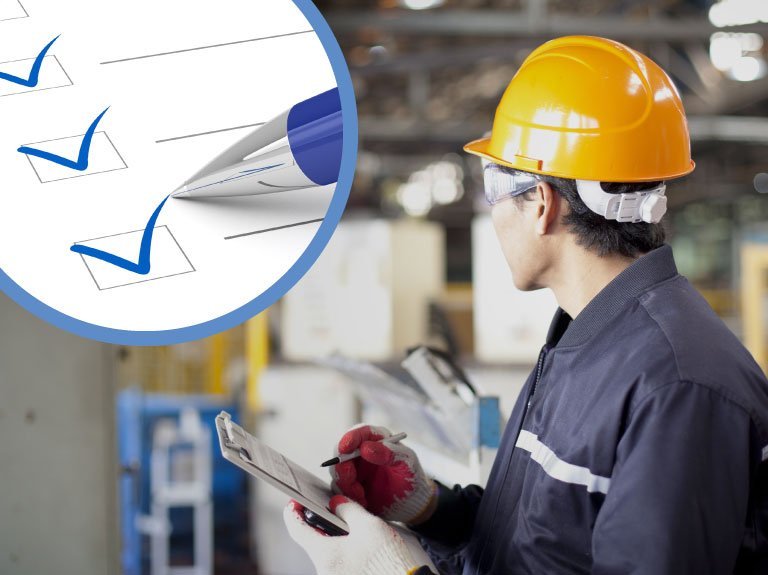
Before we delve deeper, I want to tell you why people prefer to work with factories than trading companies. There are many advantages to working directly with factories, including lower taxes, greater transparency, and establishing relationships that lead to timely communication.
Although working with factories has its advantages, trading companies will also benefit if you can find a trustworthy company. Trading companies can save your time by handling the purchasing process for you, and can find suppliers you can't find yourself, and they will have better communication and better English.
For example, when using Alibaba to source products from China, you are not sure whether the supplier is a middleman or a manufacturer. Now, when you purchase goods from China, how do you determine that the supplier is a Chinese manufacturer and not a middleman?
You have five possibilities:
a. Check their product line. For example, if your supplier is selling silicone rubber, then the factory may be equipped with silicone rubber gloves, silicone bakeware and silicone measuring cups, which means he is the manufacturer. Their entire production line and supply chain are configured to make these items with silicone rubber.
On the other hand, if the supplier provides selfie sticks, mobile phone cases and USB chargers, they are likely to be the middleman, because it is impossible for a factory to manufacture so many different kinds of goods.
b. Ask technical questions about the product you are buying. Answering technical questions will help you build confidence. If they don’t know the answers to simple technical questions, such as "How long does it take to charge?" or "Is the product heat-resistant?", then you should start to doubt the supplier.
c. Ask them directly. Usually, trading companies will reveal their true identity. In addition, real manufacturers have their own factories, not "partner factories".
d. Request to visit the factory. If you have enough time and money to visit the factory, then this may be the best way to find out whether you are purchasing from a real factory or a trading company. The factory will be more than happy to welcome you.
e. Make unplanned video calls.
3. Quality inspections
No matter how long you import from China, quality control is the key to protecting your business.
When you import goods from China to the UAE, the payment is usually paid to the manufacturer before shipping, and you risk receiving poor quality goods with few options to send them back. This process can be expensive, which means it will directly affect your business, as shipping back items and customs duties will incur high costs, not to mention the time it takes to return the goods and receive new batches.
China’s legal system is complex and you will not have any success in litigation. Therefore, your business will suffer losses due to the low quality of the goods.
When your business involves importing products from China, you must include a quality control process in the supplier’s factory. The purpose of implementing the quality control process is to identify any problems, defects and nonconforming products in the product. If your product does not meet the required specifications or general international standards and is found during the quality control process, you can easily solve these problems to solve the first batch of problems and avoid any problems in the future.
The quality control process can not only ensure the quality of the product, but also monitor the timely delivery of the product.
In this case, it is best to cooperate with a third-party inspection company or freight forwarder.
You can develop your own detailed and specific inspection protocol according to your product specifications and quality requirements. The inspection protocol may include:
-cosmetic verification;
–Function verification;
-Verification of your needs.
Be as specific as possible and make sure to provide clear details when talking to the inspector.
A third-party inspection company or freight forwarder is the most flexible and reliable choice for small and medium-sized companies. They can check whether all your requirements are met, from checking the outer box to quantity, quality, and even product pictures or other requirements. In addition, they can quickly operate across China, you can control the quality of the goods, no matter where you are, you can benefit from their expertise.
4. Ask for a sample
You have found the ideal supplier, now you don't need to rush to order large quantities of goods, just request samples first.
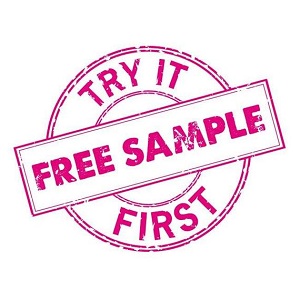
But why ask for a sample?
First, you must view, feel and test the product in real life. When purchasing goods from the B2B platform, the main concern is the product quality, and usually the product pictures are different from the actual situation (many Chinese suppliers copy images from western product catalog).
Second, this is a good way to verify suppliers. Through this process, you will see the communication method between the two parties, the speed of delivery, etc.
Third, ordering samples will establish a strong relationship with the supplier, because he will see that you are serious about it and that you are very interested in dealing with them.
Give specific details when asking for a sample.
Explain to the supplier that if the sample meets your requirements, you will place a large order.
Due to these cultural differences and language barriers, it is important to be very specific when requesting samples from suppliers.
• Every reputable manufacturer in China is used to deliver goods on time, so they should be able to communicate a clear timetable for samples.
•Imperial measurements (pounds, inches, etc.) are only used in the United States. Therefore, when doing business with international partners, you should switch to the metric system(centimeters, liters, and grams).
•After the sample is completed, a video chat is required so that you can check the appearance of the sample before it leaves the factory. This saves you time and money.
When providing the sample description to the supplier, the following content should be included:
– The complete address (country, state, region, etc.) to which the samples will be sent.
- The designated samples are marked with "Sample: No Commercial Value"-this can be exempted from packaging tariffs.
– Explain the details of the sample to be made as much as possible.
– Ask them to test the product before shipping it to you.
– Ask them to include the model number and company name on the packaging, so if you order from other suppliers, you will not confuse the samples.
5. Notes before payment
In this section of the article, we will provide you with some tips about pre-payment. This will include negotiated prices, 30% advance payment, payment terms and keeping all purchase records.
- Negotiate the price
A successful price negotiation means that you will find the right price balance with your suppliers. In other words, this means that you will pay the right price for the right quality; asking for a too low price can lead to poor quality problems and unanswerable calls. In the case of finding a balance at a reasonable price, you will have a quality product, and your supplier will make enough money to maintain the business and pay its employees.
In order to get the right price, you should consider the following
a. Set your target price - remember that price negotiation is a common practice in China;
b. Suppliers must also obtain considerable profits;
c. Before starting the negotiation, please clarify the quality requirements;
d. Negotiate prices at an appropriate time;
e. Know the cost of raw materials in time;
f. Look for other ways to get better prices.
- 30% prepay
Because there are thousands of suppliers in China, it is necessary to pay 30% in advance and 70% against the bill of lading. But for some suppliers, it is obviously not safe.
Some suppliers will not ship until you make the final payment. They do not trust the Telex Release (a message with all original copies of the bill of lading).
Most suppliers will not agree to a 30% advance payment unless they know you for a long time or use a letter of credit (bank guarantee payment) to guarantee payment for the shipment balance.
When importing from China to the UAE, a 30% advance payment is ok. However, the 70% balance can only be paid until you are sure all the items are finished or you get the copy of the bill of lading.
In addition, you must obtain a copy of the shipping documents, including the bill of lading, commercial invoice, packing list, certificate of origin. Make sure these are in the correct order.
Usually, most suppliers will require a 30% deposit before starting to arrange the order (some suppliers will try to get a 50% deposit), and 70% of the balance must be paid before the goods are packaged and delivered to the port
- Consider payment terms
A suitable payment method that meets your needs will reduce payment risk.
The following are some recommended and accepted payment methods for international trade:
– Advance Payment
– Letter of Credit
– Documents against Payments – D.A.P or D/P basis
– Documents against Acceptance (D/A)

– Advance Payment
Prepayment is a payment method that the importer (buyer) completes to the exporter (seller/supplier) before shipment.
This method will benefit the supplier because the payment is received in advance once the order is confirmed or at any time before shipment. Advance payments can also be used to negotiate reduced prices or pay initial supply costs.
However, from the buyer's point of view, this payment method is less risky because it can be paid in advance before shipment. Only choose advance payment when the buyer knows the seller in detail.
– Letter of credit (LC)
Importers and exporters choose this payment method. LC is one of the safest tools available to international traders. The letter of credit is the bank's commitment on behalf of the buyer that payment will be made to the exporter/supplier provided that the conditions specified in the letter of credit are met. In other words, the letter of credit is a guarantee from the bank that the buyer will pay the seller on time with the correct amount. The letter of credit eliminates possible risks. If the buyer cannot pay for the purchase in full, the bank is required to bear the remaining payment.
A letter of credit is usually a negotiable instrument - the issuing bank pays the beneficiary or any bank designated by it. If the letter of credit is transferable, the beneficiary can transfer the withdrawal right to another entity, such as the parent company of the company or a third party. Banks usually require mortgage securities or cash as collateral to issue a letter of credit, and also charge a service fee, usually a certain percentage of the amount of the letter of credit. The letter of credit also guarantees to the buyer that there is no obligation to pay until the goods are transported or delivered as promised or guaranteed.
The letter of credit is a vital aspect in international trade.
– Documents against Payments – Based on D.A.P or D/P
This is a payment term in international trade, which is based on an instrument generally called bill of exchange or money order commonly used in international trade. These documents will be delivered to the importer (buyer) only after payment is made by the buyer's bank.
The exporter (supplier) transports the goods, and delivers the shipping documents together with instructions to the importer’s bank to issue them to the importer for payment. The bank will hand over the transport documents to the buyer only after payment, including the proof of title (bill of lading). In short, D/P is an arrangement in which the supplier (seller/exporter) only instructs the bank to issue a shipping document after the buyer has completed all payments.
- Documents against Acceptance (D/A)
This is another payment term in international trade. It is based on a tool commonly used in international trade, called a bill of exchange or draft.
Under these payment terms, the seller (supplier/exporter) is allowed to provide credit to the importer (buyer). The buyer must accept the bill and sign a guarantee that he will pay on the set date. After signing the bill, he will receive all the documents and can clear the goods. In short, D/A is an arrangement in which the supplier only instructs the bank to issue a shipping document after the buyer signs the accompanying draft.
- Keep records of all purchases
In general, keeping records in any business is important.
You should keep a record of purchased items that you intend to resell and items that you do not intend to resell.
Roughly speaking, your records should include the date of purchase invoices, consecutive numbers, the order in which the invoices were submitted, the name of the supplier and the value-added tax.
6. Some common trade terms
The terms of trade (Terms of Trade-TOT) represent the relative export price of imports. There are many trade terms, but we will tell you about the most common trade terms in supplier quotes.
MOQ is defined by the minimum quantity of goods that the supplier is willing to sell (or produce) at a time. The minimum order quantity is usually defined by the number of goods produced in the production process (1000 or 10,000 units), but sometimes it can also be defined by currency (products of US$1000 or US$10,000).
The minimum order quantity is calculated independently by each supplier and depends on the cost of producing them. It covers cost, effort and effort, and ensures that suppliers can also make profits.
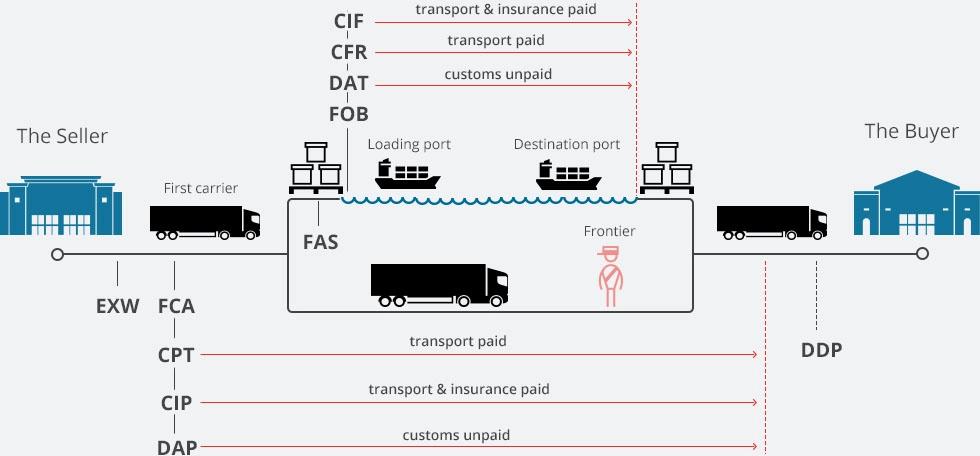
EXW (Ex Works)
If you see this offer on the website where you want to buy, it means that the seller is making the goods at his location or other designated locations. In other words, EXW means that your freight has increased by one step, and you will be responsible for the transportation from the Chinese factory to the Chinese loading port.
Using this quotation, your shipping costs will be divided into three categories:
1. From Chinese factory to Chinese airport/port
2. From Chinese airport/port to UAE airport/port
3. From the UAE airport/port to your doorstep.
On this basis, other transportation costs will also be increased, such as China's export costs and customs clearance costs.
FOB (Free on board)
FOB stands for free on board or freight on board. It is an international transportation agreement used for the transportation of goods between buyers and sellers.
FOB is the main method of Alibaba's quotation, which means that your Chinese supplier will be responsible for the transportation from the Chinese factory to the Chinese loading and unloading port.
For example, if you see the FOB Shenzhen price (Shenzhen is a city and a port in China), it means that this is the port to which the supplier will ship your order, this is the FOB price, and you are responsible for the shipping cost from here . Shipping costs are divided into two aspects:
1. From Chinese airport/port to UAE airport/port,
2. From the UAE airport/port to your door.
C&F (cost and freight)
C&F stands for "cost and freight", where "cost" refers to the cost of the goods, and "freight" refers to all other costs related to the way your goods are transported. If you see this quotation, it means that the seller will pay for the cost and freight required to ship your goods to the designated port of destination. At the same time, he will also obtain marine insurance to prevent the buyer from risk or loss of the goods during transportation.
CIF (cost, insurance and freight)
CIF stands for cost, insurance and freight, which means that the supplier is responsible for all transportation costs from the Chinese factory to the airport/port in the UAE, including insurance.
In other words, the CIF price is a fee paid by the seller to cover the cost, insurance, and freight when the package or item is lost or damaged when it is transported to the export port. The seller must bear other costs, such as additional customs, export paperwork, inspections or changes to routes, but once the goods are loaded, the buyer will bear all other costs, including the cost from the UAE airport or port to your doorstep.
When using CIF, suppliers will add extra costs to compensate for their efforts and become more expensive than FOB.
Although this term is only used for sea transportation, in fact, many importers and exporters still use it for air transportation.
The bill of lading (B/L) contains all relevant detailed information about the type, quantity, condition and destination of the goods. The bill of lading is a legal document issued to the shipper by the carrier (transportation company) as a contract of shipping goods. In other words, the bill of lading is an agreement between the shipper and the transportation company for the transportation of goods. It also represents a receipt of cargo accepted for transportation.
It can be used as a proof of ownership of the goods (document of title), and it can be issued in a transferable or non-transferable form.
The bill of lading can be used in the following ways:
- in letter of credit transactions, where it can be bought, sold, or traded;
– As collateral for borrowing money;
- In all claims for damages, delays or losses;
– Used to resolve disputes related to the ownership of goods.
Broadly speaking, the bill of lading includes:
- The name of the shipper and the consignee,
- The name of the departure and destination port,
– The name of the vessel,
- Departure and arrival date,
– List of goods to be transported (packing quantity, packing type),
– The rights, responsibilities and obligations of the carrier and the shipper,
– Marks and numbers on the packaging,
- The weight and/or volume of the cargo,
- Freight and amount.
AWB stands for air waybill, which is a legal document attached to goods shipped by international air companies. It provides detailed information about the shipment and can track it. AWB provides a copy for each party involved in the shipment.
It is also called as an air consignment note, which is a kind of bill of lading, which has a similar function to the ocean bill of lading, but is issued only in non-negotiable form.
AWB is used as a receipt for goods and contracts between the shipper and the carrier (an airline). When both the shipper and the carrier sign the document, the AWB becomes an enforceable document.
AWB roughly includes:
- Shipper's name and address
- Name and address of the consignee
- Three-letter orgin airport code
- Three letter destination airport code
- declared shipment value for customs
– Number of pieces
- Gross weight
- Product description
– Any special instructions (such as "perishable" or "fragile")
– The rights, responsibilities and obligations of the carrier and shipper
POD and POL
These two commonly used shipping terms stand for point of discharge (POD), which means the port where cargo is unloaded from the ship, and the port of loading is POL, which means the port where the cargo is loaded on the ship. < /p>
PI stands for proforma invoice, it stands for your order list. A proforma invoice is a simple contract that includes bank details, advance payment, agreed transportation conditions (such as FOB and EXW), agreed remittance terms (such as letter of credit), and delivery details.
In this step, you can negotiate with the supplier. The final version agreed will be called a commercial invoice.
B. Shipping from China to the UAE
What Shipping Options Are Available?
There are three main ways to ship your cargo from China to the UAE:
a. Sea or ocean transportation,
b. Air transportation,
c. Courier or express shipping.
Each option has unique advantages and disadvantages.
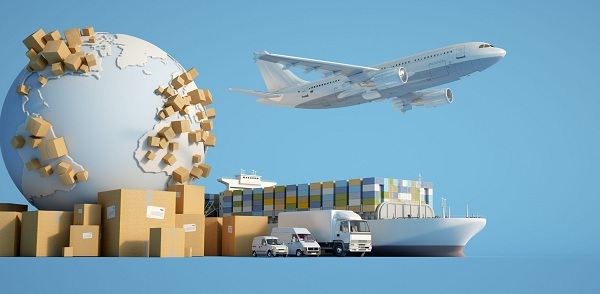
1. Sea freight
- Applicability
90% of the cargo entering the UAE arrives as sea freight, most of which are transported in shipping containers. Dubai’s Jebel Ali is the most important ocean freight port in the UAE and the largest man-made harbor in the world. However, you can also ship LCL and FCL to the UAE through ports in Abu Dhabi and Sharjah. Both of these ports, like Jebel Ali, connect the UAE with trading partners in many overseas countries.
Sea freight shipping is the main mode of transportation for global import and export business. The advantages of low price, high-volume loading, full container loading (FCL) or less than container loading (LCL) make ocean freight the first choice for most importers from UAE.
Sea transportation is also a slow mode of transportation. You need to plan ahead and allow enough room for possible delays. In addition, Chinese manufacturers do not stock any products, but make them to order, so you must be prepared.
For example, if you want to prepare goods for Christmas, you should plan ahead and place your order in August or earlier. We recommend that you place an order at least 3 months in advance.
Ocean freight starts from port A to port B, so you need to know the distribution of the main ports in the country of origin and destination.
You don't have to pay special attention to the supplier's geographic location, because no matter where he is in China, your goods will never be too far from one of the ports listed below.
Below we will show you the largest and most productive ports in the world, which are ready to ship your goods from China to the UAE.
In China, there are several ports, such as Shanghai Port, Ningbo Port, Shenzhen Port, Guangzhou Port, Tianjin Port, Qingdao Port, Xiamen Port and Hong Kong Port, and your freight can be shipped to the UAE from these ports.
There are the most important container ports: Jebel Ali port Dubai, Khalifa port Abu Dhabi, Port Khalid of Sharjah, Ajman port, Umm Al Quwain port, Ras Al Khaimah port, Fujairah port.
- How long and how much does it take for ship from China to UAE
Time – Estimated Transit Time (ETT) is the time between the Estimated Time of Departure from origin (ETD) and the Estimated Time of Arrival at the destination (ETA).
In order to provide you with a reference, I have compiled the reference time from major ports in China to ports in the UAE. hope it helps you.
| POL/POD | Jebel Ali Dubai | Khalifa Abu Dhabi | Khalid Sharjah | Ajman | Umm Al Quwain | Ras Al Khaimah | Fujairah |
|---|---|---|---|---|---|---|---|
| Guangzhou | 14 | 17 | 18 | 20 | 20 | 20 | 20 |
| Shenzhen | 14 | 17 | 18 | 20 | 20 | 20 | 20 |
| Shanghai | 18 | 22 | 24 | 24 | 24 | 24 | 24 |
| Ningbo | 18 | 22 | 24 | 24 | 24 | 24 | 24 |
| Qingdao | 22 | 24 | 26 | 26 | 26 | 26 | 26 |
| Xiamen | 18 | 22 | 24 | 24 | 24 | 24 | 24 |
| Tianjin | 25 | 28 | 30 | 30 | 30 | 30 | 30 |
ETDs and ETAs are subject to change at any time and they can never be guaranteed by your ocean carrier, and it can take up to 7 days for your cargo to be loaded at the loading port
Price - 90% of transactions are completed under these two conditions: FOB (free on board) and EXW (Ex-Works). Since CIF (cost, insurance, freight) and DAP (delivery at place) are executed by your seller, it will cost you more time and expense. Therefore, you should choose FOB or EXW, and deliver the goods to professionals at the lowest price and fastest delivery time. Choose those that can save money and precious time!
The EXW shipping cost represent the local logistics cost in China, which add China’s export cost, cost for sea freight from the Chinese port to an UAE port, UAE customs clearance cost, and local logistics cost in the UAE.
The FOB shipping cost represents the shipping cost from a Chinese port to a UAE port, plus the cost of UAE customs clearance and local logistics costs in the UAE.
2. Air freight
- Applicability
Air transportation is suitable for time-critical goods, or the unit price of the goods is high, but the quantity of goods is small (300-500kg).
You don't have to pay special attention to the supplier's geographic location, because no matter where he is in China, your goods will never be too far from one of the airports listed below. These are the largest and most productive ports in the world and are ready for air freight from China to the UAE
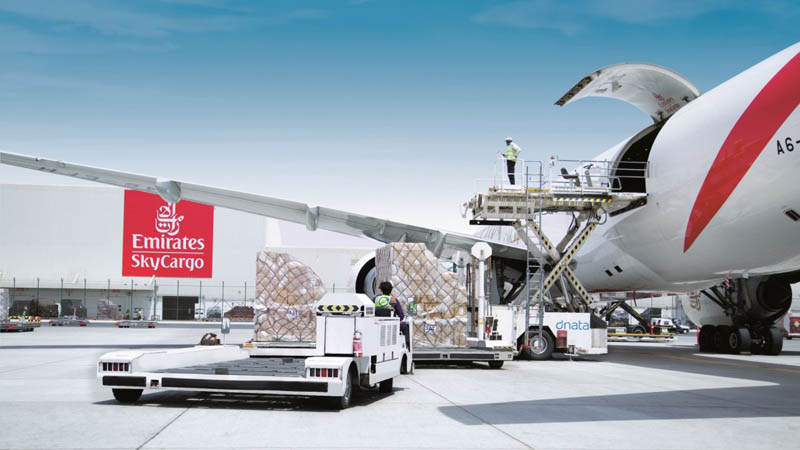
Below we will present you the main port distribution of the origin and destination countries:
• Main China airports are: Beijing Capital International Airport, Shanghai Pudong International Airport, Shanghai Hongqiao International Airport, Chengdu Shuangliu International Airport, Hong Kong International Airport, Xian Xianyang International Airport, Kunming Changshui International Airport, and Guangzhou Baiyun International Airport.
• The main airports in the UAE are: Dubai International Airport (DXB), Al Maktoum International Airport (DWC), Abu Dhabi International Airport (AUH), Sharjah Airport (SHJ).
- Time and price
Time - The transportation time of air freight is represented by the time required to book transportation space, flight time and local delivery time in the UAE.
With this mode of transportation, the delivery time and price are more flexible than sea transportation, because you can choose non-stop transfer or charter services, with different airline routes.
Generally, the air freight from China to the UAE is divided into three categories:
1 Economic air transportation: economical price, suitable for goods with low time requirements (no dangerous goods, oversized goods or temperature-controlled goods).
2 Standard air freight: reasonable price and shorter time.
3 Emergency transportation: speed priority, suitable for time-sensitive goods (perishable goods).
Price -Because the products that can be shipped by air are different, the price is also different.
From Shanghai to Dubai, the market price of "standard air freight" ranges from US$3-5.5/kg. Of course, this does not include domestic and UAE delivery. Other fees depend on your terms of trade. This part is the same as sea transportation.
The unit of calculation for air cargo is kilograms, and there are two methods to calculate the weight of air transportation:
1. They will charge based on dimensional weight of the packages.
2. They will charge based on the actual weight of the packages.
The formula for the Dimensional Weight is: Length (cm) x Width (cm) x Height (cm)/6000
I will give you an example for reference.
Let’s suppose you need to ship 1 piece of large foam that is 100cm x 100cm x 100cm, and weights 20KG. What will it be its dimensional weight?
Dimensional weight = 100 cm x 100 cm x 100 cm/6000=167 kg
So, you see, its dimensional weight is far larger than its actual weight. Hence you will be charged for 167 kg.
You will find that packing your goods skillfully and minimizing its volume, it is usually the key to saving money.
3. Courier or express shipping
- Applicability
Compared with sea or air freight, express shipping is the fastest and most convenient method of transportation from China to the UAE. With Express, the cost for Dubai and other cities in the UAE may be the same, and you don't have to worry about duty payment and customs clearance. You can also track your goods at any time and plan accordingly.
Find a courier company with a reasonable price, and wait for your goods to arrive at your address.
Express shipping means urgent and faster delivery, and its prices and rates are higher than other transportation methods. In addition, the cost of express may increase during the holidays, but may drop sharply during the off-season.
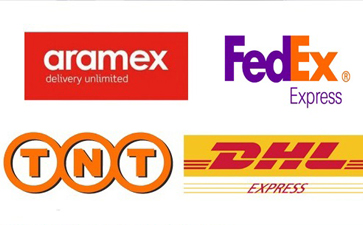
- Time and price
Time - All express companies use air freight to transport goods, so the delivery time and price are also very flexible, similar to air freight.
There are many well-known express companies such as FedEx, UPS, DHL, TNT, ARAMEX, etc.
Roughly speaking, this is the delivery time of air transportation:
• Economic delivery: The delivery time is 5-7 days and the price is reasonable. This method of transportation is suitable for goods with low time requirements (no dangerous goods, oversized goods or temperature-controlled goods).
• Standard delivery: The delivery time is 3-5 days, the price is reasonable, and the delivery time is shorter.
• Urgent delivery: delivery time is 1-3 days, speed priority, suitable for time-sensitive goods (perishable goods).
Price - Express delivery has many advantages. The unit price is usually higher than sea and air freight, but it depends entirely on your product needs.
If your goods are samples, small packages or even letters, then please choose express delivery now. This method is simple and fast.
Your freight forwarder can help you find the best solution for shipping from China to the UAE, even if your cargo quantity is slightly larger, even weighing more than 500 kg, it can also save you money and time.
The method of calculating the price is similar to standard airfreight:
1. They will charge according to the dimensional weight.
2. They will charge according to the actual weight of the package.
The formula for the Dimensional Weight is: Length (cm) x Width (cm) x Height (cm)/5000
For example, if your product package size is 50*50*50 cm and the actual weight is 10 kg, the express company will charge you 25 kg weight (50*50*50cm)/5000=25 kg) instead of the actual weight of 10 kg, if you want to ship this package from China to the UAE.
4. Customs clearance in the UAE
You need to obtain an import code from the registration department of the UAE Federal Customs Authority before you ship any commercial goods to the UAE. When you ship to the UAE, you, your freight forwarder or customs broker can usually submit an import declaration online through the automated customs clearance system of the customs authority. However, in some cases, you will have to provide the original declaration form before or after customs clearance of the goods for importation. The automatic customs clearance service can also allows for prepayment of customs duties and taxes, and even clear your goods before they arrive in the UAE. Depending on the nature of your imported goods, you may need to provide a certificate of the country of origin, or you may need to provide a report from an approved laboratory.
Customs clearance is one of the biggest challenges a buyer will face when importing from China to the UAE.
After the goods enter the port or airport in UAE, you will face customs inspection and customs clearance procedures. This work requires advance preparation and rich experience. In short, customs clearance means that when your goods arrive in the UAE, they will only be released after you have filled out the appropriate paperwork and paid the necessary duties.
When importing from China to the UAE, you must know three things: the documents to be prepared, HS codes and taxes, and inspection procedures.

- Customs clearance documents
Broadly, the documents you will need to prepare for customs clearance are:
1. A delivery order for sea or air transportation
2. A bill of lading or air waybill
3. Original commercial invoice from the exporter to the importer
4. Copies of the buyer’s trade licenses
5. Certificate of Origin for each product in the shipment
6. Packing list
7. The import customs declaration
You may need to supply other documents, depending on the type of goods you're importing. You can find a full list of documentation requirements for different importation scenarios on the website of the relevant customs authority.
- Restricted and Prohibited Items
Like many countries, the UAE government, through its various agencies, places restrictions and prohibitions on the import of specific goods categories. The following are some restricted products and the names of the controlling agencies:
1. Alcoholic beverages (controlled by the police in the destination state)
2. New tires (regulated by the Emirates Authority for Standardization and Metrology)
3. Radio equipment (under control of the Telecommunications Regulatory Authority)
4. Printed materials (controlled by the National Media Council)
5. Pharmaceutical products (controlled by the Ministry of Health and Prevention)
6. Fireworks, arms, explosives, and ammunition (controlled by the Ministries of the Interior and Defense)
Materials and products prohibited for importation into the UAE include:
1. Goods of Israeli origin
2. E-cigarettes and electronic hookah pipes
3. Used tires
4. Gambling devices and tools
5. Nylon fishing nets
6. Narcotics
7. Items contradictory to Islamic principles
Although the UAE government implements the above prohibitions, you should also check whether the GCC Common Customs Law allows your planned imports. Even if it is not displayed on the UAE’s prohibition listings, it may be prohibited under this legislation.
5. Tips for avoiding delays
Shipping delays are a common problem that can cause you to waste valuable time, and this can affect your business.
International transportation may be a complicated mode of serious transportation, or it may be an easy way to transfer goods from point A to point B, so choosing the most cost-effective and timely transportation method is essential. It is recommended to explore various modes of transportation to ensure that the goods are transported at the lowest total price.
In order to avoid time delays for shipping from China, you should be aware of holidays.
As mentioned before, knowing China’s holiday schedule and important shipping deadlines and guidelines will save you time and money, because during those peak periods, due to shortages of factory and road staff and factories close, shipping prices will rise sharply.
This may cause delays in your shipping, but to avoid this, you should plan shipping with your supplier in advance.
To avoid delays you should do the following:
– Inform about the Chinese holidays
– Choose Experienced Companies To Work With
– Complete Clearance Paperwork Correctly
– Have Your Documents Ready
C. How to save money and time when importing from China to UAE
1.Find a reliable freight forwarder
Shipping goods is a very complicated process, involving booking space, document preparation and customs clearance. Sometimes, it can be difficult to find a reliable business partner, and this is the purpose of a freight forwarder. Unless there is no other choice, don't leave the large shipment to the supplier, because the cost is mainly composed of logistics, and most sellers make this mistake because they think this is the simplest and fastest thing.
China Best Freight is a reliable and experienced agent who will help you find a solution for importing from China to the UAE. As a freight forwarder, if you do not have enough time and energy, experience, or you just want to avoid all the troubles this process may bring you, then we will do a lot for you.
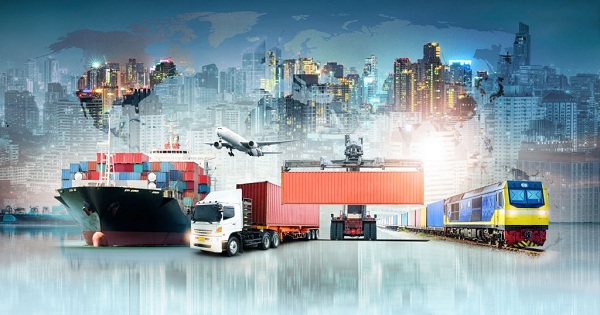
Another big advantage is the fact that a freight forwarder can help you save money, and will let you know where every cost is going, with no hidden fees.
It is considered an important asset in international transportation, because the useful services it provides can help you when you have no experience in international transportation processes, and can help you maximize your trading business.
2. Complete clearance paperwork correctly
Time delays always cost money. The common cause of the time delay is the stop of the shipment during the customs clearance process. Therefore, it is important to fill in the documents correctly. Choose your suppliers wisely, because they are the people responsible for your cargo paperwork.
3.Make sure you consolidate your cargo
It is very important to consolidate your goods, especially if you want to buy goods from several suppliers. Logistics companies can provide an consolidation process at any port of departure, where goods from different suppliers can be stored and delivered to you together as one shipment.
Therefore, we recommend that you go to a reliable freight forwarding company and tell them your needs. They will help you handle the entire transportation link at a lower cost. All you have to do is wait for the goods to be delivered.

